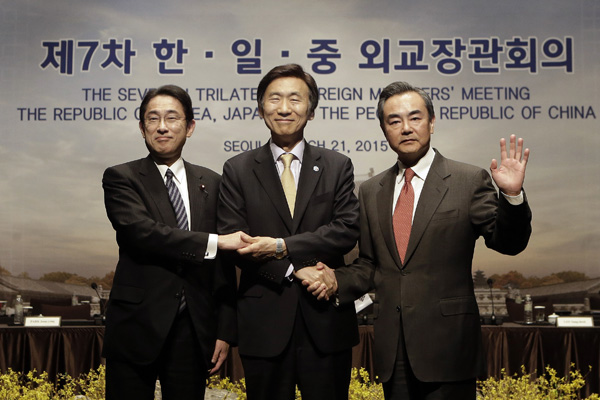Low expectations of Seoul summit necessary
Updated: 2015-10-29 07:49
By RA JONG-YIL(China Daily)
|
||||||||
 |
|
From right, Chinese Foreign Minister Wang Yi, South Korean Foreign Minister Yun Byung-se and Japanese Foreign Minister Fumio Kishida pose during the 7th trilateral foreign ministers' meeting in Seoul, South Korea, March 21, 2015. [Photo/IC] |
A trilateral summit between China, Japan and the Republic of Korea is due to be held this weekend in Seoul. This will be the first such meeting in three years, as the previous summit between the three countries took place in Beijing in 2012.
Originally, the trilateral meetings took place aside of the Association of Southeast Asian Nations summits. Later, they became a separate event. When things were better the summit was an annual event, but it has been suspended since 2012.
Thanks primarily to the size of their economies, the three countries are not just regional powers, they carry weight in international affairs on the world stage too. Together the three account for about one-quarter of the gross world product and their share is growing. There are so many things on which the three countries could cooperate to their mutual benefit. There is even an urgent agenda in the realm of high politics, as they could jointly address such pressing tasks as maintaining stability and peace throughout the region and ensuring the region's sustainable development.
However, in the past such hopes have soon fallen apart. So will this be an "old normal" or the start of a "new normal"? One of the elements in the "old normal" has been the temptation to find fault with factors external to the region as an excuse for our own failure to organize a regime of cooperation among ourselves. Being incapable of settling our own affairs for and by ourselves reflects badly on us and serves no constructive purpose. Yet there will not be many in the region who entertain high hopes of any great achievements being made at the coming summit meeting. However, the leaders of the three countries should at least be able to take this opportunity to reach an agreement on the basic principles governing the relations among themselves in the future.
The foremost of which will be that they should be able to derive correct inferences from the unhappy past. The sufferings inflicted on the people resulting from a misguided policy of the then leaders of Japan should no longer remain as a problem between the nations. The Japanese people themselves suffered too as a consequence of the militaristic aggression embarked on by their leadership in the first half of the last century.
There should be a correct recognition of those facts followed by proper support for the victims. Following on from this there should be recognition of a shared destiny in the region particularly for the three neighboring countries. If any one country fails, this immediately becomes a factor of instability in the region, adversely affecting the other countries too. In this world where the countries are closely related with one another it is the failed states that destabilize entire regions, even the world. It is ultimately to our own benefit that we should be forthcoming with our willingness to be of assistance to our neighbors in need. That may sound unrealistic at present.
The three leaders may do well to dwell on possibility of inviting the young leader of the Democratic People's Republic of Korea to their meetings in the future.
Finally, I hope there will be time for the three leaders to deliberate on their contribution to humanity as a whole. Despite all the problems it has created the state of modernity that originated in the West has made contributions to the progress of civilization. Now may be the time for the three nations in this region to seriously consider what they should and could do to ameliorate the fate of humanity in the days ahead.
The author is a University Distinguished Professor at Hanyang University and former ROK ambassador to Japan.
- Global health entering new era: WHO chief
- Brazil's planning minister steps aside after recordings revelation
- Vietnam, US adopt joint statement on advancing comprehensive partnership
- European border closures 'inhumane': UN refugee agency
- Japan's foreign minister calls A-bombings extremely regrettable
- Fukushima impact unprecedented for oceans: US expert

 Stars of Lijiang River: Elderly brothers with white beards
Stars of Lijiang River: Elderly brothers with white beards
 Wealthy Chinese children paying money to learn British manners
Wealthy Chinese children paying money to learn British manners
 Military-style wedding: Fighter jets, grooms in dashing uniforms
Military-style wedding: Fighter jets, grooms in dashing uniforms
 Striking photos around the world: May 16 - May 22
Striking photos around the world: May 16 - May 22
 Robots help elderly in nursing home in east China
Robots help elderly in nursing home in east China
 Hanging in the air: Chongqing holds rescue drill
Hanging in the air: Chongqing holds rescue drill
 2.1-ton tofu finishes in two hours in central China
2.1-ton tofu finishes in two hours in central China
 Six things you may not know about Grain Buds
Six things you may not know about Grain Buds
Most Viewed
Editor's Picks

|

|

|

|

|

|
Today's Top News
Liang avoids jail in shooting death
China's finance minister addresses ratings downgrade
Duke alumni visit Chinese Embassy
Marriott unlikely to top Anbang offer for Starwood: Observers
Chinese biopharma debuts on Nasdaq
What ends Jeb Bush's White House hopes
Investigation for Nicolas's campaign
Will US-ASEAN meeting be good for region?
US Weekly

|

|









